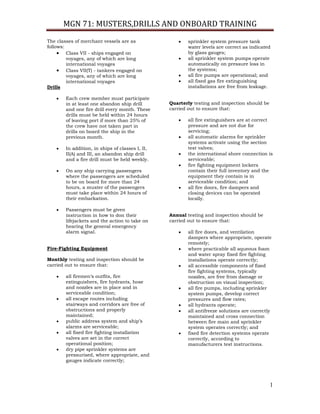
MGN 71: Monthly Drills & Inspections for Ship Safety Equipment
- 1. MGN 71: MUSTERS,DRILLS AND ONBOARD TRAINING The classes of merchant vessels are as follows: Class VII - ships engaged on voyages, any of which are long international voyages Class VII(T) - tankers engaged on voyages, any of which are long international voyages Drills Each crew member must participate in at least one abandon ship drill and one fire drill every month. These drills must be held within 24 hours of leaving port if more than 25% of the crew have not taken part in drills on board the ship in the previous month. In addition, in ships of classes I, II, II(A) and III, an abandon ship drill and a fire drill must be held weekly. On any ship carrying passengers where the passengers are scheduled to be on board for more than 24 hours, a muster of the passengers must take place within 24 hours of their embarkation. Passengers must be given instruction in how to don their lifejackets and the action to take on hearing the general emergency alarm signal. Fire-Fighting Equipment Monthly testing and inspection should be carried out to ensure that: all firemen’s outfits, fire extinguishers, fire hydrants, hose and nozzles are in place and in serviceable condition; all escape routes including stairways and corridors are free of obstructions and properly maintained; public address system and ship’s alarms are serviceable; all fixed fire fighting installation valves are set in the correct operational position; dry pipe sprinkler systems are pressurised, where appropriate, and gauges indicate correctly; sprinkler system pressure tank water levels are correct as indicated by glass gauges; all sprinkler system pumps operate automatically on pressure loss in the systems; all fire pumps are operational; and all fixed gas fire extinguishing installations are free from leakage. Quarterly testing and inspection should be carried out to ensure that: all fire extinguishers are at correct pressure and are not due for servicing; all automatic alarms for sprinkler systems activate using the section test valves; the international shore connection is serviceable; fire fighting equipment lockers contain their full inventory and the equipment they contain is in serviceable condition; and all fire doors, fire dampers and closing devices can be operated locally. Annual testing and inspection should be carried out to ensure that: all fire doors, and ventilation dampers where appropriate, operate remotely; where practicable all aqueous foam and water spray fixed fire fighting installations operate correctly; all accessible components of fixed fire fighting systems, typically nozzles, are free from damage or obstruction on visual inspection; all fire pumps, including sprinkler system pumps, develop correct pressures and flow rates; all hydrants operate; all antifreeze solutions are correctly maintained and cross connection between fire main and sprinkler system operates correctly; and fixed fire detection systems operate correctly, according to manufacturers test instructions. 1
- 2. MGN 71: MUSTERS,DRILLS AND ONBOARD TRAINING Watertight Integrity In passenger ships, drills for practicing the closing of watertight doors, deadlights, scuppers, ashshutes, rubbish-shutes and other similar devices are required to be carried out At intervals of not more than 7 days the following should be inspected: watertight doors and mechanisms, indicators and warning devices connected with such doors, valves, the closing of which is necessary to make watertight any compartment below the margin line, and valves, the operation of which is necessary for the efficient operation of damagecontrol cross-connections. Survival Craft Drills Each lifeboat must be launched with its assigned operating crew aboard and manoeuvred in the water once every 3 months during an abandon ship drill. The launching of lifeboats and rescue boats should normally take place when the ship is alongside or at anchor with little or no tide or current, A free-fall lifeboat may be lowered to the water if launching is impracticable, provided that free-fall launching with the assigned operating crew and manoeuvring in the water is carried out at least once every six months. instructed and drilled in their duties and thereafter should be mustered and similarly drilled at intervals of not more than 7 days. On-board training in the use of davit-launched liferafts must take place at intervals of not more than 4 months on every ship fitted with such liferafts. Weekly & Monthly Inspections of LSA At weekly intervals survival craft, rescue boats and launching appliances must be inspected to ensure that they are ready for immediate use. Rescue boat and lifeboat engines must be run at weekly intervals. The general emergency alarm system must also be tested every week. All lifesaving appliances including lifeboat and rescue boat equipment is required to be inspected at monthly intervals. This inspection should include the examination and testing of any fixed radio installations and searchlight equipment, and ensuring that the batteries can be charged from the dynamo when the engine is running. In lifeboats with water spray systems, each system should be tested at intervals of not more than 3 months in accordance with the manufacturer’s instructions. The system should be flushed through with fresh water after testing with sea water. Rescue boats where carried, other than those which are also lifeboats, must be launched each month with their rescue boat crews and manoeuvred in the water. The interval between such drills must not exceed 3 months. Where possible such drills should include the recovery of an object simulating a person in the water. In ships of Class I the crews of rescue and emergency boats should be mustered on the first day of the voyage as soon as possible after sailing. The crews should be fully 2
